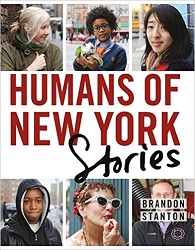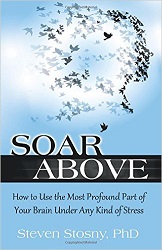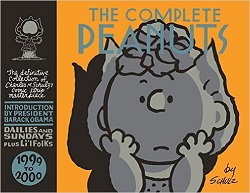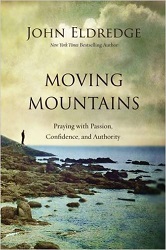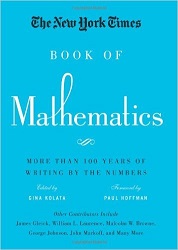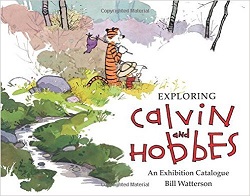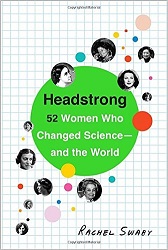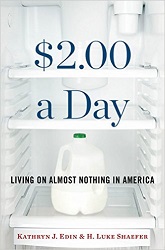 $2.00 a Day
$2.00 a Day
Living on Almost Nothing in America
by Kathryn J. Edin & H. Luke Shaefer
Houghton Mifflin Harcourt, Boston, 2015. 210 pages.
Starred Review
This book was published in 2015, so it was written before the election season got going, but it has strong political repercussions.
The book puts faces on extreme poverty, but the approach is a scientific one. Nothing here is sensationalized. The authors took statistics and facts, then dug deeper to give an understanding of what’s going on so that such deep poverty has become so widespread. At the end, they offer some ideas for things we can and should do about this.
This book is based on academic studies and census data. In the 1990s, author Kathryn Edin did an in-depth study of welfare recipients. But in 2010, she found more families in much worse shape.
In the summer of 2010, Edin returned to the field to update her work on the very poor. She was struck by how markedly different things appeared from just fifteen years before. In the course of her interviews, she began to encounter many families living in conditions similar to those she would find when she met Susan and Devin Brown in 2012 — with no visible means of cash income from any source. These families weren’t just poor by American standards. They were the poorest of the poor. Some claimed food stamps, now called SNAP, for the Supplemental Nutrition Assistance Program. A few had a housing subsidy. Most had at least one household member covered by some form of government-funded health insurance. Some received an occasional bag of groceries from a food pantry. But what was so strikingly different from a decade and a half earlier was that there was virtually no cash coming into these homes. Not only were there no earnings, there was no welfare check either. These families didn’t just have too little cash to survive on, as was true for the welfare recipients Edin and Lein had met in the early 1990s. They often had no cash at all. And the absence of cash permeated every aspect of their lives. It seemed as though not only cash was missing, but hope as well.
Edin dug deeper and met Luke Shaefer, a leading expert on the Survey of Income and Program Participation (SIPP).
That fall, during an early morning meeting in her office in Cambridge, Edin shared with Shaefer what she had been seeing on the ground. Shaefer immediately went to work to see if he could detect a trend in the SIPP data that matched Edin’s observations. First, though, he needed to determine what income threshold would capture people who were experiencing a level of destitution so deep as to be unthought-of in America. Accordingly, he borrowed inspiration from one of the World Bank’s metrics of global poverty in the developing world — $2 per person, per day. At the time, the official poverty line for a family of three in the United States worked out to about $16.50 per person, per day over the course of a year. The government’s designation of “deep poverty” — set at half the poverty line — equated to about $8.30 per person, per day. As far as Shaefer and Edin could tell, no one had ever looked to see whether any slice of the American poor fell below the even lower threshold of $2 a day for even part of a year. With the SIPP, it was fairly easy to estimate how many American families with children were reporting cash incomes below this very low threshold in any given month….
The results of Shaefer’s analysis were staggering. In early 2011, 1.5 million households with roughly 3 million children were surviving on cash incomes of no more than $2 per person, per day in any given month. That’s about one out of every twenty-five families with children in America. What’s more, not only were these figures astoundingly high, but the phenomenon of $2-a-day poverty among households with children had been on the rise since the nation’s landmark welfare reform legislation was passed in 1996 — and at a distressingly fast pace. As of 2011, the number of families in $2-a-day poverty had more than doubled in just a decade and a half.
It further appeared that the experience of living below the $2-a-day threshold didn’t discriminate by family type or race. While single-mother families were most at risk of falling into a spell of extreme destitution, more than a third of the households in $2-a-day poverty were headed by a married couple. And although the rate of growth was highest among African Americans and Hispanics, nearly half of the $2-a-day poor were white.
One piece of good news in these findings was that the government safety net was helping at least some households. When Shaefer added in SNAP as if it were cash — a problematic assumption because SNAP cannot legally be converted to cash, so it can’t be used to pay the light bill, the rent, or buy a bus pass — the number of families living in $2-a-day poverty fell by about half. This vital in-kind government program was clearly reaching many, though not all, of the poorest of the poor. Even counting SNAP as cash, though, Shaefer found that the increase in the number of families with children living in $2-a-day poverty remained large — up 70 percent in fifteen years. And even after throwing in any tax credits the household could have claimed in the prior year, plus the cash value of housing subsidies, the data still showed a 50 percent increase. Clearly, the nation was headed in the wrong direction.
Reflecting on these numbers, we, Shaefer and Edin, sought out even more confirmation that what we had found represented a real shift in the circumstances of families at the very bottom. With this in mind, we began to look for other evidence, beyond the SIPP, of the rise of $2-a-day poverty. Reports from the nation’s food banks showed a sizable rise in the number of households seeking emergency food assistance since the late 1990s. A look at government data on those receiving SNAP revealed a large increase in the number of families with no other source of income. And reports from the nation’s public schools showed that more and more children were facing homelessness. Taken together, these findings seemed to confirm the rise of a new form of poverty that defies every assumption about economic, political, and social progress made over the past three decades.
The questions the authors bring to these numbers reflect what they’re trying to explain in this book:
Statistics can help identify troubling trends like these, but they can’t tell us much about what’s going on beneath the numbers. In fact, these statistics led to more questions than answers. What had caused the rise in $2-a-day poverty among households with children? Was the landmark welfare reform of 1996 partly to blame? Were these families completely detached from the world of work? Or were they enmeshed in a low-wage labor market that was itself somehow prompting spells of extreme destitution? How was it even possible to live without cash in modern America? What were families in $2-a-day poverty doing to survive? And were these strategies different from those poor families had been using prior to welfare reform, when AFDC still offered such families a cash cushion against extreme destitution? What was so indispensable about cash — as opposed to in-kind resources such as SNAP — for families trying to survive in twenty-first-century America?
In 2012, they launched an in-depth study in four different areas in America.
In each of these places, we looked for families with children who had spent at least three months living on a cash income of less than $2 per person, per day. In most cases, these spells of such dire poverty proved to be much longer. We visited with these families over the course of many months — and, in some cases, years — talking with them frequently, sharing meals, and observing their daily lives. As common themes emerged from their stories — such as their surprisingly high level of attachment to the formal labor market and the frequency with which doubling up with family or friends precipitated a spell of $2-a-day poverty — we looked back to the SIPP and to other sources of data to see if we could see them there as well.
In the end, we followed eighteen families, eight of them featured here. As had been true of those Edin first encountered in the summer of 2010, some of these households received SNAP or lived in subsidized housing. But others weren’t getting even those benefits. During the course of our fieldwork, some of these families escaped $2-a-day poverty; others did not. Most escaped only to fall back into extreme destitution again.
The book does show the reader these families, helps the reader understand what’s going on, puts faces on this level of poverty. Rather than demonizing the poor as just looking for government hand-outs, we can see and begin to understand how people can get trapped in this.
Here’s the concluding section of the Introduction:
America’s cash welfare program — the main government program that caught people when they fell — was not merely replaced with the 1996 welfare reform; it was very nearly destroyed. In its place arose a different kind of safety net, one that provides a powerful hand up to some — the working poor — but offers much less to others, those who can’t manage to find or keep a job. This book is about what happens when a government safety net that is built on the assumption of full-time, stable employment at a living wage combines with a low-wage labor market that fails to deliver on any of the above. It is this toxic alchemy, we argue, that is spurring the increasing numbers of $2-a-day poor in America. A hidden but growing landscape of survival strategies among those who experience this level of destitution has been the result. At the community level, these strategies can pull families into a web of exploitation and illegality that turns conventional morality upside down.
None of the people whose stories appear in this book see a hand-out from the government — the kind that the old system provided prior to welfare reform — as a solution to their plight. Instead, what they want more than anything else is the chance to work. They would like nothing better than to have a full-time job paying $12 or $13 an hour, a modest dwelling in a safe neighborhood, and some stability above all else. In the 1990s, we, as a country, began a transformation of the social safety net that serves poor families with children. More aid has been rendered to a group that was previously without much in the way of government assistance — the working poor. Extending the nation’s safety net in this way has improved the lives of millions of Americans. But there are simply not enough jobs, much less good jobs, to go around. And for those without work, there is no longer a guarantee of cash assistance.
$2.00 a Day shows that the transformation of the social safety net is incomplete, with dire consequences. We believe the time has come to finish the job. Doing something more to help these families won’t be easy; it will require a commitment by all of us. The government’s emphasis on personal responsibility must be matched by bold action to expand access to, and improve the quality of, jobs. But there will always be circumstances in which work as a primary approach to alleviating poverty won’t work. In those cases, we need a system that truly acts as a safety net for families in crisis, catching them when they fall.
The bulk of the book looks at the lives of these eight families in detail. It helps you understand and feel the pain of the plight they face. You have to admire some of the creative ways they’re finding to survive.
The authors particularly look at things like “perilous work” — jobs that even endanger health, that don’t offer reliable hours and terminate employment at the slightest “offense.” They look at housing problems and cobbled-together solutions, and what the poor will do to try to keep their children safe.
This is an academic study, but the authors are good at telling the stories of the people they encountered.
In their chapter on solutions, the authors don’t advocate going back to welfare, since it robbed people of their dignity and self-worth. They point out that the Earned Income Tax Credit has the opposite effect.
In-dept interviews with 209 EITC claimants in the Northeast and Midwest in 2007 showed that while TANF receipt confers stigma and shame, claiming the EITC gives people dignity and restores their pride. First, the EITC is tied to employment. Second, tax credits are included as part of your federal tax refund — along with wages that were overwithheld. This lends the impression that the government benefit is “earned,” a just reward for hard work. Third, you don’t have to go to a welfare office to apply — an address that in and of itself connotes stigma. Instead, roughly 70 percent of EITC beneficiaries find their way to a professional tax preparation firm such as H&R Block, Liberty Tax Service, or Taxman. There you are not a supplicant. Instead you are a customer, there to claim your tax refund like any other American.
I could relate to this because, when my husband joined the Air Force, before I found a job at our new assignment, we qualified for WIC. But to get the benefits, we had to sit through a “class” teaching about nutrition, and all the staff pretty much treated the applicants as idiots. I never went back. Fortunately, I found a part-time job, but I remembered that getting this government assistance meant giving up my dignity. (The Earned Income Credit, though, was another story.) That’s one thing I love about libraries. We offer help to all, and there is no shame tied to it.
The authors go on:
We are not arguing here that the EITC is a solution to $2-a-day poverty. But it does offer a critical lesson in how antipoverty policy ought to be crafted. Too often, America has gone down the road of trying to shame those in need. We’ve put up barriers. We’ve made people jump through hoop after hoop — all based on the not-so-subtle presumption that they are lazy and immoral, intent on trying to put something over on the system. TANF is a perfect example. Yet research shows that the intrusive treatment people typically receive at the welfare office can undermine their confidence in government and erode political participation. It stands to reason that this kind of treatment could also erode the very confidence that is so necessary for pulling yourself out of $2-a-day poverty. Shame may act as a barrier to claiming that little bit of cash that might stop a downward spiral. As a nation, the question we have to ask ourselves is, Whose side are we on? Can our desire for, and sense of, community induce those of us with resources to come alongside the extremely poor among us in a more supportive, and ultimately more effective, way?
There are many more ideas of things we can do in that final chapter.
Our approach to ending $2-a-day poverty is guided by three principles: (1) all deserve the opportunity to work; (2) parents should be able to raise their children in a place of their own; and (3) not every parent will be able to work, or work all of the time, but parents’ well-being, and the well-being of their children, should nonetheless be ensured.
There’s so much more in this book I’d like to copy out. Don’t rely on my review, because you’ll miss so much. This book is worth reading! It’s impeccably researched and clearly presented, and it will stir your heart.
hmhco.com
Buy from Amazon.com
Find this review on Sonderbooks at: www.sonderbooks.com/Nonfiction/2_dollars_a_day.html
Disclosure: I am an Amazon Affiliate, and will earn a small percentage if you order a book on Amazon after clicking through from my site.
Source: This review is based on a library book from Fairfax County Public Library.
Disclaimer: I am a professional librarian, but I maintain my website and blogs on my own time. The views expressed are solely my own, and in no way represent the official views of my employer or of any committee or group of which I am part.
What did you think of this book?
 Symphony for the City of the Dead
Symphony for the City of the Dead